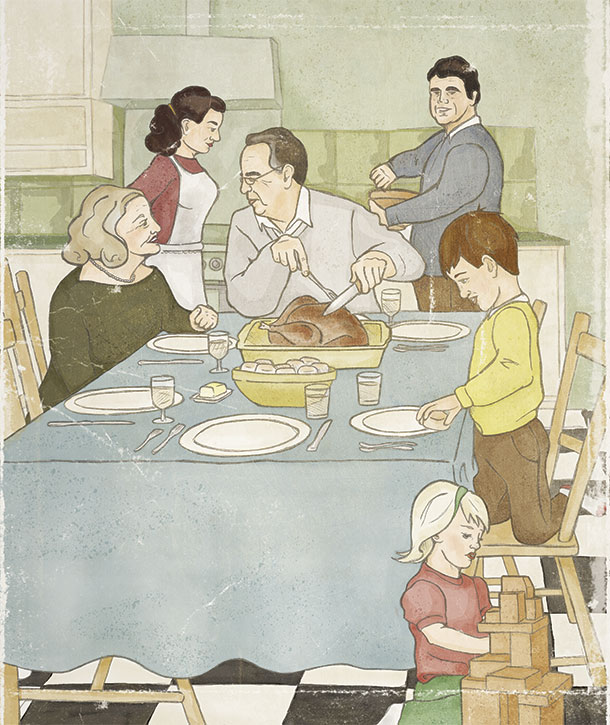
It’s a family feast that takes days of preparation and only a manner of minutes to complete. It’s a time for family and friends to come from near and far to spend the day cooking, laughing, talking and ruminating a meal that typically equates to two.
It’s also a time to remember why you live so far away in the first place.
Extra chairs and tables are set out, youngsters run around, and the older generation sits quietly, beaming at their growing posterity – while secretly hoping the grandkids won’t color on their new couch.
It’s a time of messes, memories and longing for the ones who are no longer here to celebrate. It’s a time of turkey-induced naps, football and card games. It’s a time for something Americans rarely do anymore: eat together.
According to an article in The Atlantic, the average American eats one in every five meals in the car, one in four Americans eat at least one fast-food meal every single day, and the majority of American families report eating a single meal together less than five days a week.
But for one day every year, roughly 47 million Americans will travel by sky or road to gather around a table for a home-cooked meal. Some will opt out of cooking and go to their local Applebee’s, but many go the traditional route with the aroma of fresh rolls and Mama’s pumpkin pie, a recipe only she can perfect.
Today, the average American is at least three generations removed from the farm – and it’s obvious. The lack of education on where food comes from is evident by the amount of people entangled by marketing snares. Companies paint vivid images of emission-producing factories and Franken-foods rather than picturesque pastures and rolling hay fields.
You could say it’s ironic more than half of our early Pilgrim settlers died of starvation before the first Thanksgiving while Americans today are concerned with eating too much rather than too little and whether it’s labeled as non-GMO, organic, grass-fed or gluten-free.
We’ve come a long way since the Pilgrims stepped off the Mayflower. We have YouTube to walk us through how to stuff a turkey, we have GPS systems that hold our hand through big cities, and we have smartphones that send texts, tweets, likes and pokes as fast as rotary knives on a self-propelled forage harvester.
But gone are the days when families sat together without a magnetic pull from a glowing screen. Gone are the days kids not only knew milk didn’t come from the store but got up at 5 a.m. to work in the parlor. Now, more than ever, Americans need a day of thanks, a day that pulls them from their material possessions and brings them back to their roots – their agricultural roots.
I think, in a sense, today’s Americans feel like something is missing. The natural instinct to grow and prepare food is instilled in all of us. “To break bread together,” is a phrase commonly seen in the Bible. It signifies just how powerful a meal is in building and mending relationships, impeding hunger and encouraging peace and prosperity. Different cultures, different races and different opinions can sit for a meal and feel united.
It doesn’t take a college history course to see as America progressed in technology and wealth, we gradually devalued that very link that binds us together. In fact, research has found in homes that do not hold a regular family dinner, there is increased obesity and drug and alcohol rates, and a decrease in a child’s academic success and in parent-child relationships. Some research also suggests regular family dinners correlate with higher life satisfaction.
To add to the statistics, researchers have also studied the effect growing food has on people. Multiple studies note gardening as being “good for your health,” not only because of the nutritional benefits but also the mental and emotional benefits.
Gardening has been found to lower levels of stress, improve depression symptoms and lower the risk of developing dementia – a process now called “horticultural therapy,” aka “farming.”
While Thanksgiving has meant different things to different people over the years, now more than ever Americans need Thanksgiving to sit together and be united, setting aside political views, racial differences and opinions on who’s allowed in whose bathroom.
We need to sit together with family and friends and share a meal prepared, and maybe even grown, from the “sweat of our brow.” We need to count our blessings, hold our complaints and be grateful for a meal, regardless of its USDA label.
J.R.R. Tolkien, British philologist and author, once said, “If more of us valued food and cheer and song above hoarded gold, it would be a merrier world.” And that’s exactly why Americans need Thanksgiving in 2017. ![]()
ILLUSTRATION: Illustration by Kristan Phillips.

-
Cassidy Woolsey
- Editor
- Progressive Forage
- Email Cassidy Woolsey









